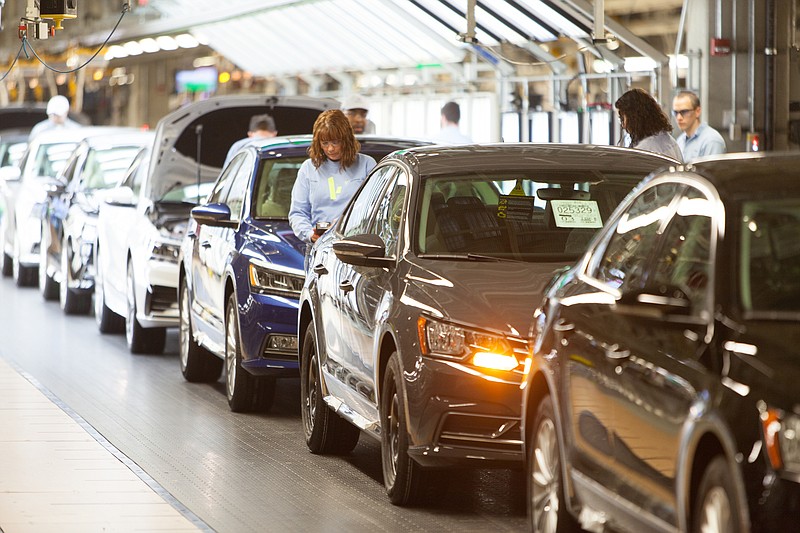Tennessee Gov. Bill Lee, U.S. Rep. Chuck Fleischmann and Hamilton County Mayor Jim Coppinger could find other things to talk about. Politicians have little trouble along that line.
But it wasn't just to hear themselves speak that the above office-holders and others suggested in recent weeks that Volkswagen production and maintenance vote not to affiliate with the United Auto Workers (UAW).
Each of the above may have their feelings one way or another about unions in general, but each of them has had casual and high-level conversations with business recruiters and business executives who are trying to entice businesses to the state or are considering locating their businesses here.
If there is a strong union presence in the industry or in the area, the politicians have been told, the businesses will look elsewhere. They don't need the trouble, they say.
Plenty of other states would be glad to have them and would be delighted to offer them incentives similar to what Tennessee might be promising.
In 2018, Tennessee was ranked second in the country in a survey by Thumbtack as to how friendly the state is to small businesses, and in the first quarter of 2019, new business filings increased 9 percent compared to 2018. Further, the state in recent years has been in or near the top 10 of all states for business in general.
The elected officials, wanting to keep the state a desirable place to locate businesses, felt it was their duty to speak out, whether to VW employees (as Lee did) or publicly (as Fleischmann and Coppinger did).
The interference from elected officials - though speech is hardly interference - is one factor UAW cited Friday in its second loss in a little more than five years in an attempt to organize workers at the Chattanooga VW manufacturing plant.
Indeed, union officials had even made the claim before the 833-776 vote against unionization.
UAW spokesman Brian Rothenberg called the elected leaders' words "threats and intimidation."
Mary Mancini, chairwoman of the Tennessee Democratic Party, took up the argument after the vote.
"Those in powerful positions work to divide us," she said. "In Tennessee, labor unions embody our values of looking out for each other, whether we're white, black or brown, 10th generation or newcomer, blue collar or white."
Mancini's argument, of course, was a false one considering there were individuals of all stripes on both sides of the UAW vote.
Ironically, the belief that unions did not embody "values of looking out for each other" may have caused some VW workers to vote against the UAW.
It was only April, after all, when former UAW Vice President Norwood Jewell pleaded guilty in federal court in Detroit to accepting tens of thousands of dollars in meals and golf trips from Fiat Chrysler, which the union had represented.
That incident, coupled with the union's history of closed plants, laid-off workers, thoughts of union money going to support politicians the workers would never back, and the constant drip, drip, drip of union dues likely made other VW employees think twice about bringing in an outside organization to represent them.
Volkswagen, officially neutral in both votes, switched from being very helpful to union officials in 2014 to a more hands-off approach this year. The company wasn't saying, but we believe its management could see the advantages in not having a union at its only U.S. manufacturing plant.
That said, VW would only help itself - and apparently already has begun doing so - in hearing any disgruntled worker concerns in "open dialogue" with management.
That dialogue, according to the company, already has resulted in wage increases, including a 50-cent-an-hour starting pay increase effective July 1, reduced overtime for more worker predictability, and adjusted shift work.
The company also brought back former popular plant CEO Frank Fischer this spring.
VW will need a satisfied workforce as it both recovers from its 2015 diesel cheating scandal in the minds of U.S. car buyers and attempts to sell them on a different type of car than the company did in 1968 when it asked buyers, "Do you earn too much to afford one [VW Beetle]?"
The company, from which the last Beetle will roll off the assembly line this year, now seeks a place in the forefront of U.S. buyers with its SUVs, including the Chattanooga-made Atlas, and its first electric vehicle, which also will be made here and is expected to debut in 2022.
The electric vehicle announcement earlier this year included an $800 million expansion and the promise of some 1,000 more jobs. Whether the expansion - and the state's $50 million in incentives to sweeten the pot - would have happened with a UAW presence is debatable.
Today, VW and its employees are a successful team that is poised to move the automaker into the future. And that future is likely to be more clear without the presence of the UAW.
